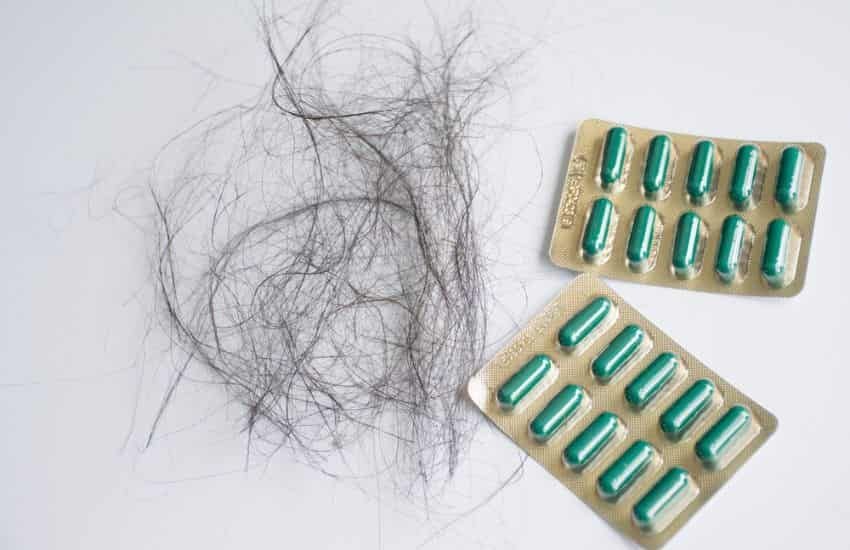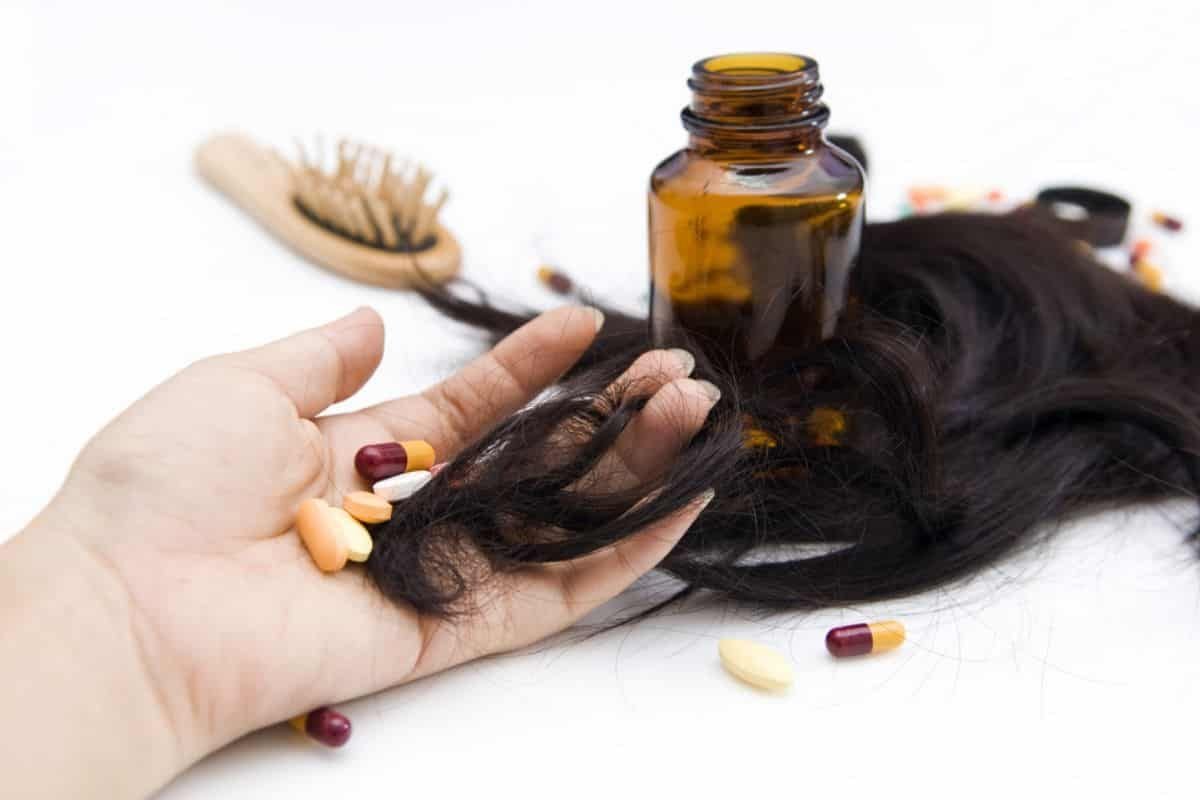Have you ever wondered which material coats your meds and vitamins? It’s actually an additive called magnesium stearate.
Magnesium stearate is a fine white powder widely used to produce and manufacture pharmaceuticals, cosmetics, food, and other products.
This compound has been proven to have numerous benefits, but there have also been studies that suggest a link between magnesium stearate and hair loss.
In this article, we’ll discuss magnesium stearate and its link to hair loss. And also talks about the potential health risks and discovers the best type of magnesium for hair loss. Keep reading to learn about magnesium stearate and its impact on your hair.
What is magnesium stearate?
Magnesium stearate is a white or yellowish-white powder that forms with the bond of stearate molecules and magnesium ions. It is an ester of stearic acid and magnesium salt, which gives it its grecery texture.
Stearate comes from stearic acid, which is just a fancy way of saying a long-chain saturated fat found in many foods, such as:
- Cocoa butter
- Coconut oil
- Eggs
- cheese
- chocolate
- walnuts
- Palm oil
- Salmon
Magnesium stearate has been approved for use in food, cosmetics and pharmaceuticals by the US Food and Drug Administration (FDA).
What is magnesium stearate used for?
Magnesium stearate has a myriad of applications due to its anti-caking properties and is primarily used in three sectors:
- Medication: Magnesium stearate is an additive commonly used to create pills and tablets. It acts as a ‘flow agent’ that prevents the powder in a capsule from sticking to each other and the machine that forms the capsules.
- Food Industry: In the food industry, it is used as an additive to prevent ingredients from clumping together. Mostly found in baking powders, salt, and spices to keep these products flowing freely.
- Cosmetic Industry: Magnesium stearate is also widely used in cosmetics, and provides a silky texture to powders and creams. It also helps bind and thicken cosmetic products, ensuring they remain stable and effective.
Magnesium stearate also slows down the breakdown and absorption process of medications so that they can be absorbed in the right spot in the bowel.
Connection between Magnesium Stearate and Hair Loss

Telogen effluvium is a type of hair loss that often occurs after experiencing severe stress or a change in the body.
This excessive hair shedding is usually caused by a significant physical or psychological shock, but some studies claim that it could also be triggered by an excess of magnesium in the body.
One study found that a group of test subjects who were given excessive amounts of magnesium chloride experienced telogen effluvium after 3 months. However, this study did not specifically focus on magnesium stearate.
It only provides insight into the potential link between magnesium and hair loss. However, further research is required to confirm these results.
Does magnesium affect hair loss?
No, there’s no solid proof that magnesium stearate directly causes hair loss. Most studies you see online are based on personal stories and not backed by any scientific evidence.
However, too much magnesium in your body might lead to hair loss due to its potential impact on nutrient absorption and balance.
As discussed above, one study shows that magnesium stearate might be linked to telogen effluvium – a form of hair loss that is caused by a disruption of the normal hair cycle.
It’s also important to note that any nutritional deficiencies caused by excessive magnesium could also lead to hair loss. So, it’s important to ensure you get all the necessary nutrients from your diet to keep your hair growing healthy and strong.
Also Read: Does Serrapeptase Cause Hair Loss? Complete Guide
What type of magnesium is best for hair loss?

When it comes to the type of magnesium best for hair loss, many people seem to prefer Magnesium Oil.
It helps increase circulation in the scalp which can stimulate hair follicles, promoting growth and reducing hair fall. Plus, it can be easily applied to the scalp and is generally safe for use.
Another type of magnesium that works great in preventing hair loss is magnesium glycinate. It’s a mixture of magnesium and the amino acid glycine. When you combine magnesium with amino acids, it actually boosts its bioavailability.
This means that it’s one of the best magnesium supplements for preventing hair loss. Plus, it won’t cause any stomach issues.
Health Risks of magnesium stearate
According to Healthline, magnesium stearate is generally considered safe to consume. But, if you consume too much, it can have a laxative effect. It can irritate the lining of your bowels, causing spasms and resulting in a bowel movement or even diarrhea.
Some researchers believe excessive usage might interfere with the body’s ability to absorb vital nutrients and cause nutrient deficiencies.
Some people also claim that magnesium stearate suppresses your immune T-cell function and messes up the cell membrane integrity of your helper T cells. However, there is no scientific evidence to support those claims.
Those claims are based on just one mouse study, which only focused on stearic acid, not magnesium stearate. Mice lack an enzyme in the T cells that humans possess. This means that stearic acid is safe for us to consume.
Finally, people with a sensitivity to stearic acid may experience allergic reactions to magnesium stearate when using products that contain it.
Conclusion
In conclusion, magnesium stearate doesn’t directly cause hair loss. And don’t believe anything you read on the internet as truth. Your hair loss may be linked to excess magnesium in the body, which can interfere with nutrient absorption and balance.
However, more research is needed to fully understand this connection between magnesium stearate and hair loss.
It’s possible you may be allergic to magnesium stearate, so look for organic and all-natural foods, supplements, and medications whenever possible.
Do research first if you are worried about any medications or supplements you take. If there are no internet research studies to back up those claims you’re searching for, they are likely false.
Read labels carefully, as this additive is common in many products. If magnesium stearate is listed as an ingredient, talk to your doctor.
FAQ
Is magnesium stearate safe to consume?
Magnesium stearate is generally considered safe to consume, but, if you ingest too much it can have a laxative effect as it can irritate the mucosal lining of your bowels.
Is magnesium good for hair and scalp?
Yes, Magnesium is essential for healthy hair and scalp. It is one of the best minerals that helps your hair to keep strong, stimulates growth, and prevents breakage. It has more than 700 functions in the human body. It’s good to take it from foods like spinach, avocado, dark chocolate, leaf vegetables, cashews, and bananas.
Can magnesium make your hair thicker?
While there’s not much research that directly links Magnesium to healthier, thicker hair, it can help keep your hair strong and prevent breakage. However, Dr. Cheruki says, “Magnesium helps break down carbohydrates into energy for the body. This energy promotes cell regeneration and scalp circulation, leading to thicker, healthier-looking hair.
What is magnesium stearate used for?
Magnesium stearate is a widely used additive in food and medication. It’s also known as octadecanoic acid or stearic acid. This is a saturated fatty acid that works as an emulsifier and anticaking agent. It helps keep ingredients from sticking together and improves the texture of the finished product.
Resources
- https://ninaross.co/blogs/health-wellness-posts/magnesium-hair-growth
- https://www.webmd.com/vitamins-and-supplements/what-is-magnesium-stearate
- https://www.ncbi.nlm.nih.gov/pmc/articles/PMC5655391/
- https://www.healthline.com/health/magnesium-stearate

Dr. Usman is a medical content reviewer with 12+ years of experience in healthcare research and patient education. He specializes in evidence-based health information, medications, and chronic health topics. His work is based on trusted medical sources and current clinical guidelines to ensure accuracy, transparency, and reliability. Content reviewed by Dr. Usman is for educational purposes and does not replace professional medical advice.
